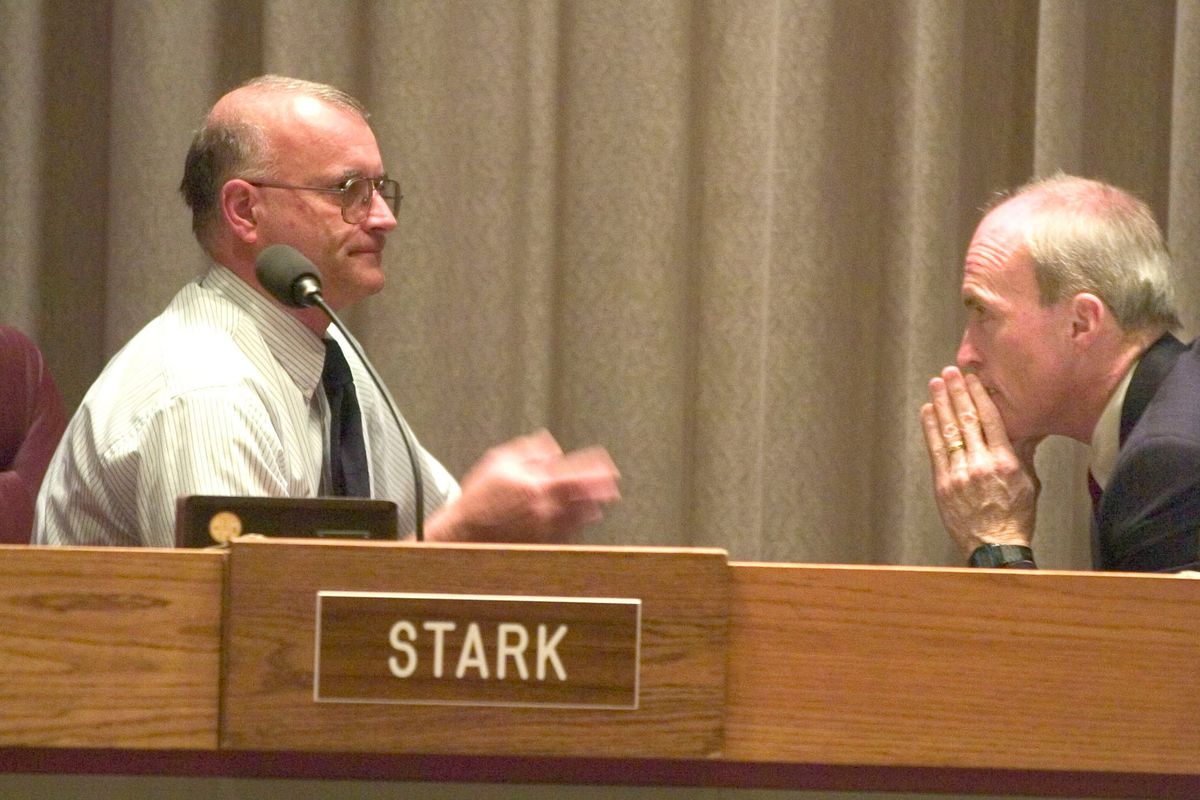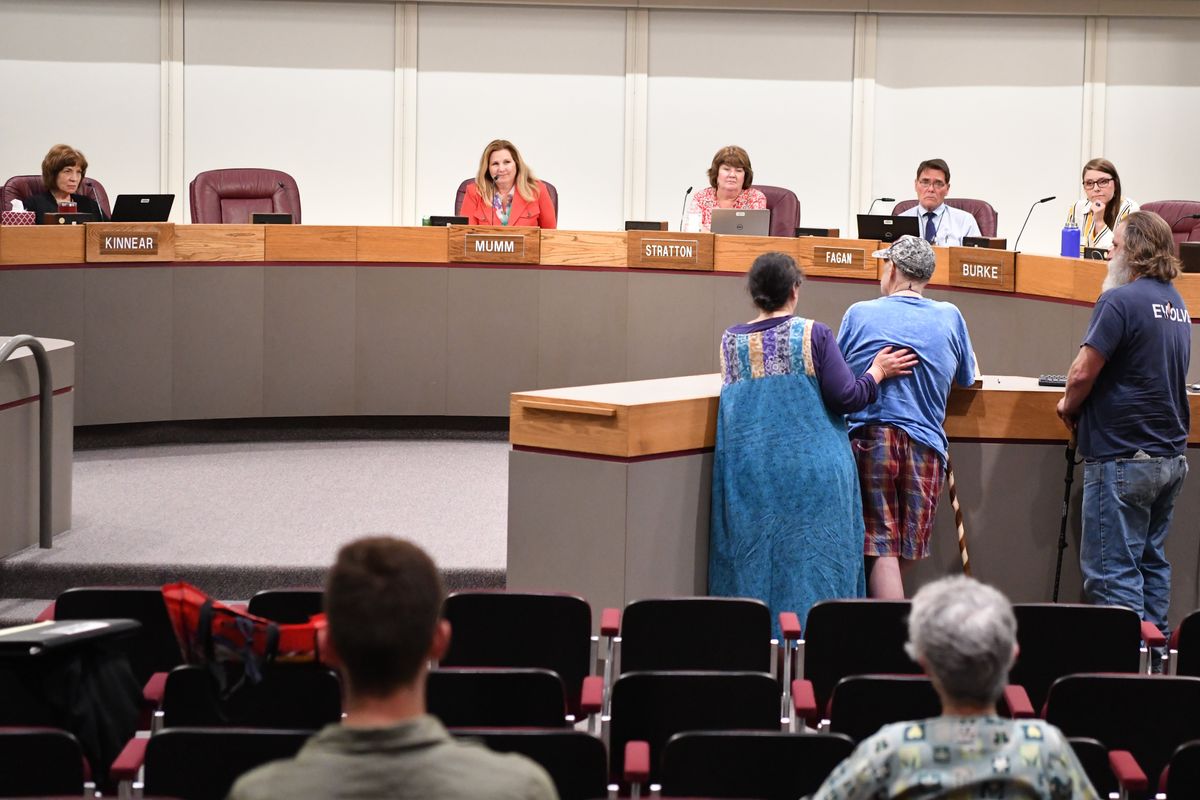‘Shadow government’ or just government? Woodward latest mayor to criticize size of City Council office
Spokane City Council President Breean Beggs turns away after taking the podium and thanking the City Council for its help during his term during the council meeting July 10 in the Spokane City Council chambers at Spokane City Hall. It was his last meeting as council president. (Jesse Tinsley/The Spokesman-Revi)
Amid a looming budget crunch and continued tensions between Spokane’s executive and legislative branches, the size of the City Council office is under growing scrutiny from Mayor Nadine Woodward and some running for Council.
The budget and staffing for the council office has ballooned in the past two decades, with the latest spike as Woodward entered office. She argues it is further evidence that the city council is trying to claim some of the strong mayor’s authority.
“While (my office) is doing more and more work with fewer people, they’ve kind of got a shadow government, so to speak, on the other side of the seventh floor,” Woodward said in an April interview. “That is costing taxpayers quite a bit of money, and it’s a bloated, bloated operation.”
Most who have served on the council during this period of expansion, including the past five council presidents – one of whom is Dennis Hession, who also served as mayor – believe that the growth was in part a result of a changing relationship between mayors and the council, though they don’t all agree on who or what is to blame.
Council President Lori Kinnear, who has served on the council since 2016 and before that worked as a council assistant, said that the council office has grown as a natural result of the clear separation of Spokane’s legislative and executive branches.
“The council does not supervise or direct the mayor’s staff, period,” she said. “So if we’re not hiring our own staff, we have no one to do research, no one to do what needs to be done to pass legislation.”
It’s true that the office has grown significantly since the start of Spokane’s strong mayor system in 2001, when the mayor and council stopped sitting on the same dais.
The salary of council members and the council president has increased from $18,000 and $40,000, respectively, in 2001 to around $48,000 and $63,000, respectively, by 2022, though these raises were approved by the independent Salary Review Commission. The salary of a council member would have been around $31,000 if just adjusted for inflation and nearly $70,000 for the council president.
More significant has been the increase in staff, something that is at the discretion of the City Council. The office employed a secretary and a single intern two decades ago and has since added assistants for the council president and every council member; a budget director; an office director, a communications director; a policy adviser who in some ways acts as legal counsel; and five managers for various policy areas such as homelessness.
Adjusted for inflation, the City Council’s office spent around $1.3 million 10 years ago, compared to roughly $2.4 million budgeted for this year, an 85% increase. For comparison, the city budget has increased 47% during the same decade, adjusting for inflation.
The budget for the mayor’s office has remained essentially flat during the same period, from $1.35 million spent in 2013 adjusted for inflation to $1.33 million budgeted for 2023.
Meanwhile, the city is eyeing a possible multimillion-dollar deficit headed into 2024 – an early July estimate from the administration has the city drawing down its reserves by more than $7 million and still having a $4 million hole, not factoring for some major expenses such as fire department overtime. More recent projections place that deficit as high as $24 million.
Some candidates for City Council, including Katey Treloar running to represent south Spokane, argue that the council office should be the first place to face cuts.
Randy McGlenn, a neighborhood council leader who ran unsuccessfully for City Council in the primary earlier this month, specifically pointed to the position of council policy adviser, filled by Christopher Wright, Councilwoman Karen Stratton’s husband and a former attorney who served as Spokane Park Board president. Wright’s salary is around $107,500 per year.
Two current council members have also raised concerns about the cost of that and other positions. In January, Council members Jonathan Bingle and Michael Cathcart voted against hiring Wright, stressing that their dissent was not about Wright as a candidate, but with the position itself and its high price tag.
“It’s a very challenging issue, because obviously we’re a citizen council, we’re not coming at this as experts, and you want input to make good decisions,” Cathcart said in a July 27 interview. “But are these positions necessary or the right positions?”
Cathcart said he agreed that efficiency in the council office should be considered during budget talks, though he noted that it would be a “very small portion overall of our budget crisis.” He suggested that there should be a joint staff shared between the council and the mayor’s office, with clear guardrails so neither branch of city government could limit access to the other.
Kinnear doubts Cathcart’s proposal is possible.
“What if the mayor and council are not in agreement on how staff should proceed on any given topic?” she said. “I don’t know that that’s feasible, quite frankly.”
Citizen legislators
Some who served on the council when the office was lean question whether the expansion has improved the work of the city’s legislative branch.
Former Councilman Bob Apple, who served from 2004 to 2011, came into office during the early days of the city’s strong mayor form of government when the council employed one full-time staffer.
Initially, being on the Spokane City Council was generally considered a part-time service, though its members have reported working an average of 40-60 hours a week for decades.
Early on, the council didn’t have its own staff to help develop policy, but instead relied on the input of advisory committees and primarily worked directly with city staff.
“We accomplished a lot more without the help than we do with the help,” Apple said . “It’s a horrible waste of money. The council, if they’re involved, they need to be the ones asking the questions.”
Apple also said that the relationship between the council and the administration has changed since he was elected.
“I used to be able to talk with city staff and management and get answers immediately,” he said. “Now the council is unable to do what they want to do and change what they want to change because they get stories from executive staff saying that’s impossible, we can’t do it.
“Now they hire staff to look into it.”
Former Councilman Rob Crow, who served from late 2005 to 2007, participated in conversations about hiring assistants for individual council members but left before they were hired. He noted that council members have said they often worked 60 hours a week, on top of full-time jobs most had to supplement their $18,000 salary. At the time, the council agreed assistants would ease some of the administrative burden, Crow said.
Four part-time assistants for council members were hired in 2008, adding to the executive assistant already employed. By 2010, the council employed its own budget analyst, a mirror to the administration’s chief financial officer, and every council member had their own assistant.
In 2011, Ben Stuckart was elected City Council president. With him at the helm, the council made strengthening its autonomy a goal. Council assistants became full-time employees, both because of growing workloads and a desire that they earn benefits, Stuckart said.
“We were all really clear we wanted to assert the independence of this branch of our government. This is one step in that direction,” Stuckart said in 2015 when the council hired Brian McClatchey, attorney and husband of current mayoral candidate Lisa Brown, as its first policy adviser. That position was envisioned as a mirror of the city attorney, who is appointed by the mayor.
In late 2019, as Stuckart prepared to leave the dais and Woodward prepped to enter the mayor’s office, the City Council approved hiring its own communications director and five new policy advisers focused on areas of interest such as homelessness or transportation.
Stuckart said he had opposed adding those positions, though he also believes then-Mayor David Condon forced the issue by interfering with the council’s access to city staff.
“When you do that, you are being so uncooperative that council is going to hire its own staff,” he said. “If you had a mayor that followed the law and shared staff equally, you wouldn’t need all those new positions.”
The City Council director, the council’s most recently added position, acts as a chief of staff. That position is held by former council assistant Giacobbe Byrd, who will receive a yearly salary of more than $117,000.
Conversely, Woodward has said that the City Council has been miserly with the budget of her office, last year refusing to fund a chief of staff position for her.
“My mayor’s office has five individuals working in it,” she said in April. “Boise has 20. Salt Lake has 34.”
Woodward is only the latest mayor to criticize the growth of the council office since 2001.
In late 2019, the City Council spelled out that being a council member was a full-time job, which, though innocuous on its face, was seen as the latest chapter in the decadeslong debate over which branch wields power and influence in Spokane city government.
“Philosophically, I think people want a citizen legislature. They don’t want a professional legislature,” Condon said at the time, noting the dramatic increase of the city council budget. “What is the benefit to the citizens?”
Hession, who served on the council from 2001 to 2005, first as a council member and then as council president, and also as mayor from late-2005 to 2007, also believes that the council has been morphed into a body more likely to clash with any mayoral administration.
“It’s in part due to the fact that we now have council members who are more highly compensated, spend more time in City Hall, and they have staff who are responsible to look for things to actualize their positions,” he said.
“Unfortunately, I think that this system itself has created an opportunity for conflict,” he added.
“But I don’t necessarily think it has to be that way.”
Like Kinnear, former Councilwoman Candace Mumm argued that the changes were inevitable, however.
“This was an implementation of the voter’s wishes for a strong mayor and a strong council,” she said.
Council staff were necessary because relying on staff supervised by the mayor put those employees “in the crossfire” if the mayor disagreed with the council’s policy priorities, Mumm said. In some cases, she said the council moved an existing position into the council’s office, such as a budget director.
In other cases, staff serving both branches made it clear that they would choose a side, Mumm said. She pointed to city spokesman Brian Coddington, who has served under two mayoral administrations. While he ostensibly works on behalf of both sides of City Hall, he’s also Woodward’s unofficial chief of staff, and previously drafted news releases on behalf of the council that they often disagreed with, Mumm said.
“It became clear we needed a dedicated comms officer,” she said.
Joe Shogan, who was elected to council in 2004 and served as council president from 2006 to 2011, said he originally wasn’t in favor of expanding the council office to include part-time assistants.
“But if you have a hostile relationship and council feels it’s not getting the info or assistance it needs, then you get this growth of the council staffing,” he said.



